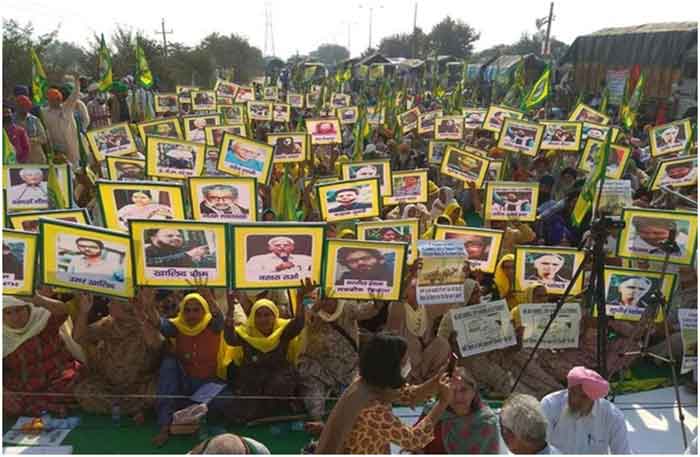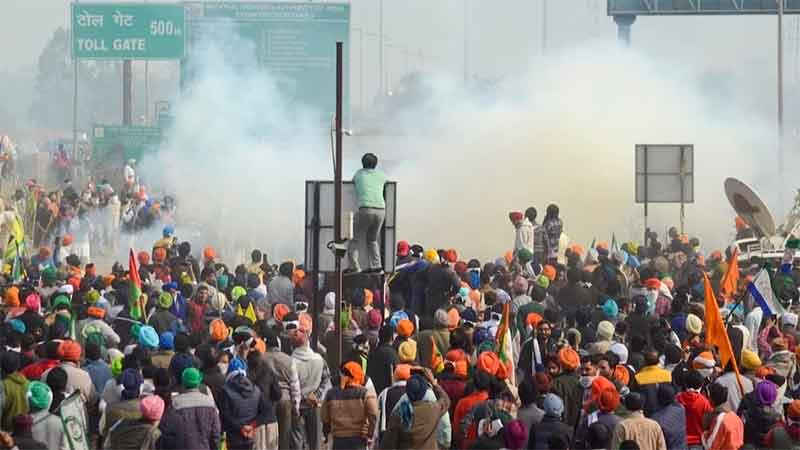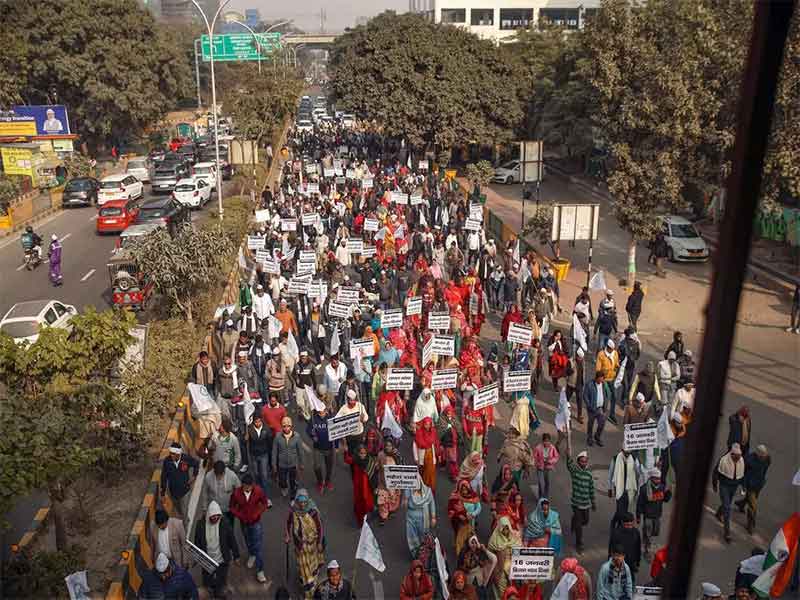
Mahatma Gandhi fought the British and their sedition case, invented Satyagraha (righteous indignation) and laid down his life for communal unity.
He might have never imagined that the British weapon of sedition law would be used against Satyagrahis in Independent India. He strongly opposed bad laws and awakened the nation saying non-cooperation with evil is equal to cooperation with good. Non-violent Satyagraha was his mantra, which is now under attack of lathis and lawless goons.
On 29 January 2021, a masked group of around 150 persons descended on Singhu border, hurled petrol bombs and destroyed the camp of farmers, who were peacefully agitating against three farm laws enacted against their interest.
On 26th January, a few Journalists and leaders tweeted about an incident with a mistake, for which they are facing ‘sedition’ charges which may end them up in life sentence.
From Republic Day to Tees January (30th January, Gandhi’s murder anniversary) the Indian Republic is celebrating the attacks on agitators, crackdown on Satyagraha and sedition cases on journalists for writing or tweeting. Gandhi was icon of Satyagraha and his trial for sedition during the British Raj is historic episode that showcases his courage against dictatorial rule.
Communal forces did not allow frail (for fasting) 78-year-old great soul of India to enjoy the freedom, which he struggled for, not even for a few months, and even before the agenda for democracy and development – the Constitution for India – was drafted, he was removed from this world.
Today, the Constitution of Indian Republic is under attack. Freedom of Press is threatened by sedition case-strategy of the Sarkar.
After Bal Gangadhar Tilak was punished to imprisonment on charges of sedition, it was Gandhi who faced the harsh law.
The trial of Mahatma Gandhi, the author of impugned articles and Shankarlal Ghelabhai Banker, editor, and printer and publisher respectively of Young India, on charges under Section 124A of the Indian Penal Code was held on Saturday, 18th March, 1922, before C N Broomfield, JCS, District and Sessions Judge, Ahmedabad.
The then Advocate General J T Strangman, with Rao Bahadur Girdhartal Uttamram, Public Prosecutor of Ahmedabad, appeared for the Crown. A C Wild, Remembrancer of Legal Affairs, was also present. Mahatma Gandhi and Shankarial Banker were undefended. Among the members of the public who were present on the occasion were: Kasturba Gandhi, Sarojini Naidu, Pandit M M Malaviya, N C Kelkar, J B Petit and Anasuyabahen Sarabhai.
It was alleged that Gandhi was “bringing or attempting to bring into hatred or contempt or exciting or attempting to excite disaffection towards His Majesty’s government established by law in British India, and thereby committing offences punishable under Section 124A of the Indian Penal Code,” the offences being in three articles published in Young India of September 29 and December 15 of 1921 and February 23 of 1922.
The offending articles were then read out: The first of them was, “Tampering with Loyalty”; the second, “The Puzzle and its Solution” and the last, “Shaking the Manes.”
When charges were read out to him and asked whether he would plead guilty or claimed to be tried, Gandhiji said: “I plead guilty to all the charges. I observe that the King’s name has been omitted from the charge, and it has been properly omitted.” The Judge asked Banker the same question and he too readily pleaded guilty. When he was asked whether he would give statement, Gandhi gave the following statement:
“Before I read this statement, I would like to state that I entirely endorse the learned Advocate-General’s remarks in connection with my humble self. I think that he was entirely fair to me in all the statements that he has made, because it is very true and I have no desire whatsoever to conceal from this court the fact that to preach disaffection towards the existing system of government has become almost a passion with me, and the Advocate-General is entirely in the right when he says that my preaching of disaffection did not commence with my connection with Young India but that it commenced much earlier, and in the statement that I am about to read, it will be my painful duty to admit before this court that it commenced much earlier than the period stated by the Advocate-General…….”
The only course open to you, the Judge, is, as I am going to say in my statement, either to resign from your post, or inflict on me the severest penalty if you believe that the system and law you are assisting to administer are good for the people. I do not expect that kind of conversion. But by the time I have finished with my statement you will have a glimpse of what is raging within my breast to run this maddest risk which a sane man can run.”
This was followed by Gandhi’ written statement as given here: “My public life began in 1893 in South Africa in troubled weather. My first contact with British authority in that country was not of a happy character. I discovered that as a man and an Indian, I had no rights as a man because I was an Indian. But I was not baffled. I thought that this treatment of Indians was as excrescence upon a system that was intrinsically and mainly good. I gave the government my voluntary and hearty cooperation, criticising it freely where I felt it was faulty but never wishing its destruction. Consequently, when the existence of the Empire was threatened in 1899 by the Boer challenge, I offered my services to it, raised a volunteer ambulance corps and served at several actions that took place for the relief of Ladysmith (…).
The first shock came in the shape of the Rowlatt Act, a law designed to rob the people of all real freedom. I felt called upon to lead an intensive agitation against it. Then followed the Punjab horrors beginning with the massacre at Jallianwala Bagh, and culminating in crawling orders, public floggings and other indescribable humiliations. I discovered too that the plighted word of the Prime Minister to the Musalmans of India regarding the integrity of Turkey and the holy places of Islam was not likely to be fulfilled. But in spite of the forebodings and the grave warnings of friends, at the Amritsar Congress in 1919, I fought for cooperation and working of the Montagu-Chelmsford reforms, hoping that the Prime Minister would redeem his promise to the Indian Musalmans, that the Punjab wound would be healed, and that the reforms, inadequate and unsatisfactory though they were, marked a new era of hope in the life of India. But all that hope was shattered.” (…)
In fact, I believe that I have rendered a service to India and England by showing in non-cooperation the way out of the unnatural state in which both are living. In my opinion, non-cooperation with evil is as much a duty as is co-operation with good… The only course open to you the judge and the assessors is either to resign your posts and thus dissociate yourself from evil. If you feel that the law you are called upon to administer is an evil and that in reality, I am innocent or to inflict on me the severest penalty, if you believe that the system and the law you are good for the people of this country and that my activity is therefore injurious to the commonwealth.”
Such a great soul, Gandhi openly criticised the British rule as evil and its law of sedition as evil. It is a shame that we killed both Gandhi and his strong message to treat as law of sedition itself as evil. We also attempted to his Satyagraha method of agitation to express our opinion against the farm laws which will harm the farmers and benefit purchasing companies.
(Author Dr. Madabhushi Sridhar Acharyulu was a Professor at Nalsar University of Law in Hyderabad, former Central Information Commissioner and presently Professor of Law, at Bennett University, Greater Noida. Email:[email protected])
Courtesy: Hans News Service
IF YOU LIKED THE ARTICLE SUPPORT PEOPLE’S JOURNALISM















































